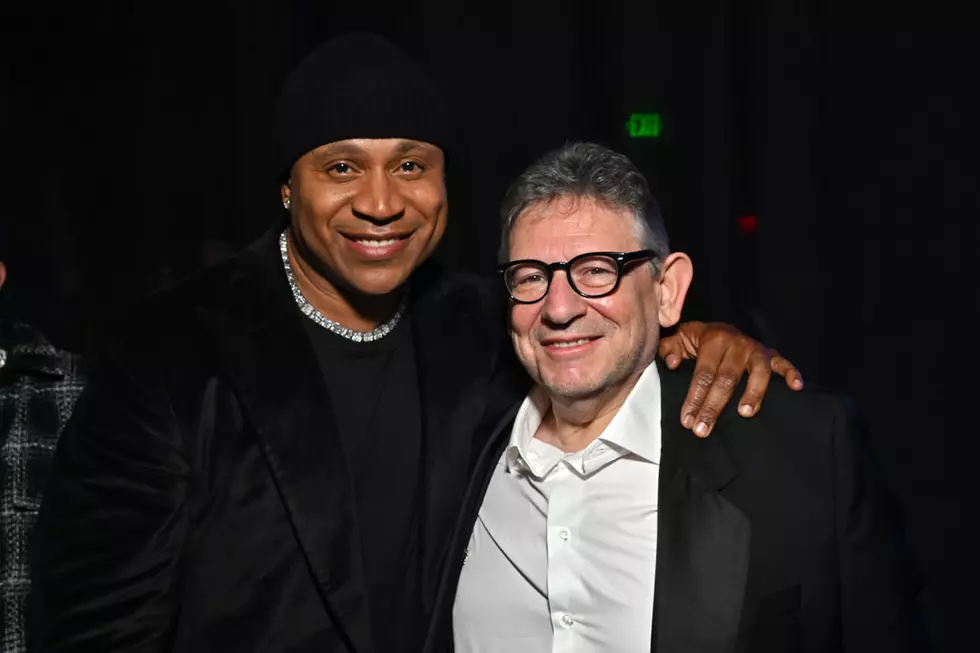Ryan Lewis Steps Into The Spotlight With New Charity Projects
The prototypical vision of the rap battle involves a bruised and poverty-stricken Rabbit intensely staring down his opponent in front of a massive crowd that looks wild enough to storm the stage at a moment’s notice. On Wednesday, a pool of 12 producers—one sporting a bowtie and others sporting affable, around-the-way demeanors—performed in front of Ryan Lewis and industry heads inside of the well-furnished MSR Studios in Manhattan. 8 Mile this was not.
Lewis and clothing brand Buffalo David Bitton hosted a “Beat Battle,” where the producers played their best instrumentals for the chance to win $5,000, a Twitter shout out from the Heist producer and a shopping spree. It seems pretty trite for someone who’s trying to make it as a producer, but Lewis knows the deal. Instead of studio enclaves near Midtown Manhattan with a dozen or so attendees, Lewis came up thanks to battles whose winners (the prize: $200) depend on the response of a crowd of 200-300 people. So Lewis knows pressure.
That’s not to say some pressure didn’t rest on Lewis’ shoulders when he judged the Beat Battle; it’s rough to judge instrumentals from different genres. The competition saw competitors dabble in EDM, hip-hop classicism and a bit of trap. The contest descended from 6 vs. 6, 3 vs. 3, 2 vs. 2 (with an eliminated producer returning), to 1 vs. 1. By the end, Preston, Ga.’s Jonathon Eley—a wiry 19-year-old with ecstatic dance moves to match his maximalist beats—won after entertaining the judges.
The event wasn’t quite about competition as much as it was about goodwill, however. The multi-platinum producer corralled the contestants for a quick Q&A about what software he uses, how long it takes him to craft beats and how one stands out in an industry in which it's becoming increasingly harder to break through.
Of course, Lewis' philanthropy isn’t limited to the music industry. Lewis spoke to XXL about his 30/30 Project to help HIV/AIDS-afflicted communities, production battles and his taste in beats. —Brian Josephs
XXL: Can you explain a little bit about the inspiration behind the 30/30 Project for those who don’t know?
Ryan Lewis: The 30/30 Project is a collaboration between my family and Construction For Change, a non-profit contractor. What they do is build infrastructure, buildings for various non-profits around the world doing things, like orphanages, medical centers, schools and things like that.
What a lot of people don’t know is that my mom has been HIV positive for 30 years. I think getting up to that 30-year mark, she wanted to do something substantial. When she was diagnosed, she was given three years to live. So this is 10 times longer than what she was predicted. So it was a big moment for our family, and she’s been working for Construction For Change, which builds infrastructure that will sustain for 30 years. So it’s kind of a happy marriage between those two numbers.
So I take it this is more personal than your other charitable efforts.
It’s very personal. It’s a huge part of my family story. It’s a huge part of my upbringing and my own experience. In that regard, it was a very genuine idea and mission to go out and do it. Part of it is this greater conversation to tackle life-threatening illnesses that can be managed but aren’t because there is no access to health care. The other half of the conversation is my mom surviving 30 years because she did have access to those medications.
Where I’m from, rapper battles are more of a thing than producer battles. What’s being judged in this case?
There are so many MC battles that the producer battle is that event for the producer to go up and play their best beats. I’ve always loved them; I’ve gone to several throughout the last 10 years. How they typically go is there is a club of 200-300 people and you either get a "boo" or a "yeah," and it’s all crowd applause-based. You’re usually trying to play your heat and your hardest beats that will get some heads bobbing in 10 to 15 seconds.
Are you looking more at creativity or more of that earworm factor?
I’m an open book. If somebody plays something that’s beautiful, something super catchy, or something that’s super hard, all I can do is compare listening to that to whatever the other dude is going to play and which caught my ear more. That could be for a variety of reasons.
When it comes to producers like yourself, is it more about competition or creativity?
I think most producers and MCs are constantly in this competition, but it’s usually with yourself. It’s usually wanting to be innovative; wanting to catch yourself when you’re doing the same thing or throwing out the same art you’ve already done. I’m not trying to make beats that are better than somebody else’s. I’m trying to make beats that are genuine to me.
How is it being a spokesperson for Buffalo David Bitton’s Spring Campaign when you’re mostly seen as a behind-the-scenes kind of guy?
It’s been organic. I didn’t wake up in February and go, “Oh, I want to be a spokesperson.” But 30/30 happened and stuff like this happened, and it’s been cool. I’m not a shy person at all; I’m in many ways a louder person than Ben [Haggerty, a.k.a Macklemore]. But I’m a producer, and he’s always been an entertainer. He’s a live performer. I’m not gonna pretend that I possess the incredible talent he has in that regard. I guess my job has always been to build the music, direct the videos, to do all the things that usually fall behind the scenes.
Previously: Producer Ryan Lewis Launches A Project To Fight Against HIV
14 Hip-Hop Heads Who Are Down For A Cause
Ryan Lewis Clears Up Macklemore’s Costume Controversy
More From XXL









